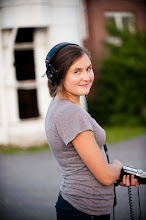I was initially drawn to doing a story on the Lewiston Somali community's food culture. I wondered how the Somali's eating habits had been affected by years in Kenyan refugee camps and transplantation to cold, temperate Maine. I was also curious about their views on American food and culture. I spent an afternoon poking around five or six of the Somali-run shops and restaurants on Lisbon Street, learning about Somali foods (I knew little) and trying to cast my story's characters.
 Mogadishu, a small store and eatery on Lisbon Street fit well into the narrative I was envisioning. I returned to Lewiston and spent another Saturday at the store, this time with my flash recorder and mic. Mogadishu carries everything from cardamom and halal goat meat, to laundry detergent and winter jackets, and is a gathering point for Somali families and groups of women. During my visit, I recorded the sounds cooking: the spatter of frying sambusa and slow bubble of goat meat simmering in a garlicky tomato and cilantro sauce. I also met several of the store owner's children, who speak impeccable American English. I imagined the story would follow the arc of a day, beginning in the store with the cooking of samosas, segueing to the Lewiston middle school cafeteria for lunchtime, where both American and Somali children eat an all-American meal provided by the school. The story would come to a close in the store owner's home, over a traditional Somali dinner.
Mogadishu, a small store and eatery on Lisbon Street fit well into the narrative I was envisioning. I returned to Lewiston and spent another Saturday at the store, this time with my flash recorder and mic. Mogadishu carries everything from cardamom and halal goat meat, to laundry detergent and winter jackets, and is a gathering point for Somali families and groups of women. During my visit, I recorded the sounds cooking: the spatter of frying sambusa and slow bubble of goat meat simmering in a garlicky tomato and cilantro sauce. I also met several of the store owner's children, who speak impeccable American English. I imagined the story would follow the arc of a day, beginning in the store with the cooking of samosas, segueing to the Lewiston middle school cafeteria for lunchtime, where both American and Somali children eat an all-American meal provided by the school. The story would come to a close in the store owner's home, over a traditional Somali dinner.NPR Northeastern Bureau Chief Andrea de Leon paid her annual visit to Salt on Tuesday and this is the story I pitched her. But on Wednesday, I had an interview with someone named Amy from Coastal Enterprise Initiatives, a local community-development organization, that may have changed everything. I almost canceled the interview because I thought the information was no longer relevant to my story. Lesson learned: never cancel an interview. Amy has spent years working with the Somali community and provided such invaluable insight into Somali - especially Somali female - culture, which is of particular interest to me. Lesson two learned: know the issue, but also know the organization; I'd studied up on Somali culture, but not on CEI.
Amy told me the story of one Somali Bantu woman in particular. After ten minutes, I was sold. Utterly ready to drop everything, scratch my carefully crafted scenes and pitch again. I'm meeting Amy in Lewiston tomorrow, and she's going to introduce us. I'm going with an open mind, but am going to listen to my gut.
Three weeks into Salt, one thing is abundantly clear: the story-building process isn't linear, and is far from predictable.

1 comment:
Sounds like a cool story's coming together one way or the other! When I got trained on public insight we learned much the same thing: if you keep eyes and ears open beyond the specific idea you're looking for, you might find someone or something more, or better. And that's pretty much how it's worked.
Hope you're having fun!
Post a Comment